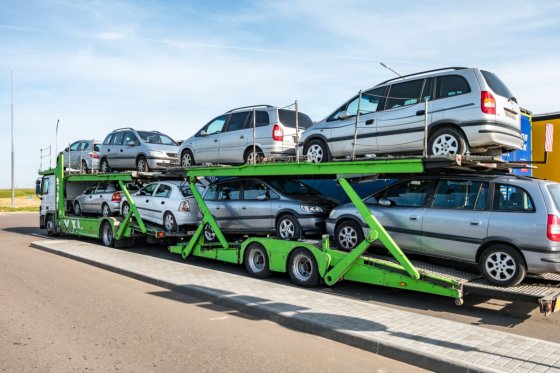
The cabs of large trucks sit high above the road, offering drivers a better view of the roadway. Unfortunately, the increased height of tractor trailers may increase the possibility of a rollover accident—a problem with which a truck accident lawyer can help if you’re caught in one
Increased height gives large trucks a higher center of gravity. A higher center of gravity inherently results in an imbalance that significantly increases the risk of a rollover accident. Commercial trucks can weigh up to 80,000 lbs, including the weight of the truck itself and its cargo. Large trucks involved in rollover accidents create substantial danger for the occupants of other nearby vehicles. Even if the smallest truck were to have a rollover accident the destruction that follows can be just as severe. It's safe to assume that any of the common trucks you would find on the road a huge risk to other drivers during a potential rollover accident.
Many factors contribute to increased risks of rollover accidents involving commercial trucks. Some common factors contributing to rollovers include:
1. Improperly Loaded Cargo
Often, truck drivers rely on third party loading companies to load the cargo onto their vehicles. Consequently, truck drivers not know that someone improperly loaded or secured the cargo. Truck drivers may only realize the loader’s error when the cargo begins to shift. Oftentimes, improperly loaded cargo increases the danger of a rollover accident.

Often, truck drivers have little recourse when it comes to redistributing the weight of their load while on the roadway. As cargo shifts or falls, it can cause the truck to rock from side to side. The weight imbalance, coupled with the higher center of gravity, dramatically increases the risk of a rollover accident.
In other cases, the cargo may actually cause extreme imbalance interfering with the driver’s ability to control the vehicle. For example, by design, flatbed trucks have poor balance, but typically carry extremely heavy loads. Drivers may be unaware of instability in a flatbed load and fail to take corrective action before it’s too late.
Cargo must be properly secured to prevent the load from shifting or falling off. Security straps must be the proper type and strength for the specific load. Regularly inspecting the security straps may prevent instability leading to a rollover accident.
2. High Rates of Speed
Excessively high rates of speed contribute to as many as 40 percent of rollovers across both passenger vehicles and commercial trucks. High rates of speed may hinder a truck driver’s ability to correct even the slightest driver error. Speeding on a steep incline and slipping off the shoulder of the road can cause a rollover accident in an instant.
Frequently, rollovers occur when drivers simply misjudge the speed at which they can safely maneuver a curve. On winding roads, posted speed limits for trucks are often lower than speed limits for passenger vehicles. To reduce the risk of rollover accidents, truckers must be aware of road conditions and traffic laws.
3. Jackknife Accidents
A jackknife accident occurs when the trailer of the truck swings perpendicular to the cab. Jackknife accidents are particularly dangerous because the trailer of the truck often swings into multiple traffic lanes. The trailer, no longer controlled by the force of the cab, can cause extreme imbalance leading to a rollover. When trucks jackknife, especially in poor weather conditions, truck drivers may struggle to bring their vehicles back under control. Simply stopping the cab of the truck may not stop the momentum of the trailer.
In fact, stopping too abruptly may increase the risks of a rollover accident. Unfortunately, once a trailer jackknifes, many drivers can do little to prevent further damage. Commonly, jackknife accidents occur in sharp curves when cargo is improperly loaded or driver’s use excessive speeds.
4. Driver Error
A truck driver must have adequate time to react to other vehicles and obstacles on the roadway. Because large trucks require more time and distance to change lanes or stop, unexpected obstacles can be problematic for drivers. Drivers may overreact and steer too sharply to avoid an obstacle, leading the truck off the road and causing a rollover. Other driver errors may include:
- Distraction or inattention. A moment’s inattention can cause a truck’s tires to veer off of the road, leading to a rollover accident. The risks of a rollover increased when a truck driver is distracted. A truck may travel the length of a football field in the seconds it takes to check a text message. Other distractions, such as eating or drinking while driving, can cause a driver to lose track of the truck’s position. Overreacting to shifting lanes or veering off the road can increase the risk of a rollover accident.
- Inebriation. Driving under the influence of drugs or alcohol can cause drowsiness and disorientation. Even over-the-counter cold and flu medication can affect a driver’s ability to safely maneuver a commercial truck. Many medications and illegal substances impair motor function, which can substantially increase the risk of any type of accident. Rollover accidents are no exception.
- Taking a curve too fast. In a curve or turn, especially a sharp curve or turn, trucks face a great deal of centrifugal force. The force can cause instability and in some cases, cause a dangerous imbalance. When a driver takes a turn too fast, the resulting imbalance may lead to a rollover accident.
5. Weather Conditions
Poor weather conditions increase the risks of an accident for all drivers. These conditions can cause decreased traction and load instability. Slick roads due to rain or ice can quickly cause a truck’s tires to slide over the edge of the shoulder. Unstable road conditions may prevent a driver’s ability to take corrective action. Extremely high winds may also pose an extreme hazard to truck drivers. Because cargo trucks have such a high center of gravity, high winds can manipulate the trailer contributing to a rollover. In poor weather conditions, truck drivers must slow down and exercise extreme caution to protect themselves and the other drivers.
If you suffer injuries in a truck rollover accident, you may need to seek the advice of a truck accident attorney. An attorney can help you navigate the claims process and determine the compensation you deserve for your injuries. Contact a truck accident lawyer as soon after your accident as possible.



